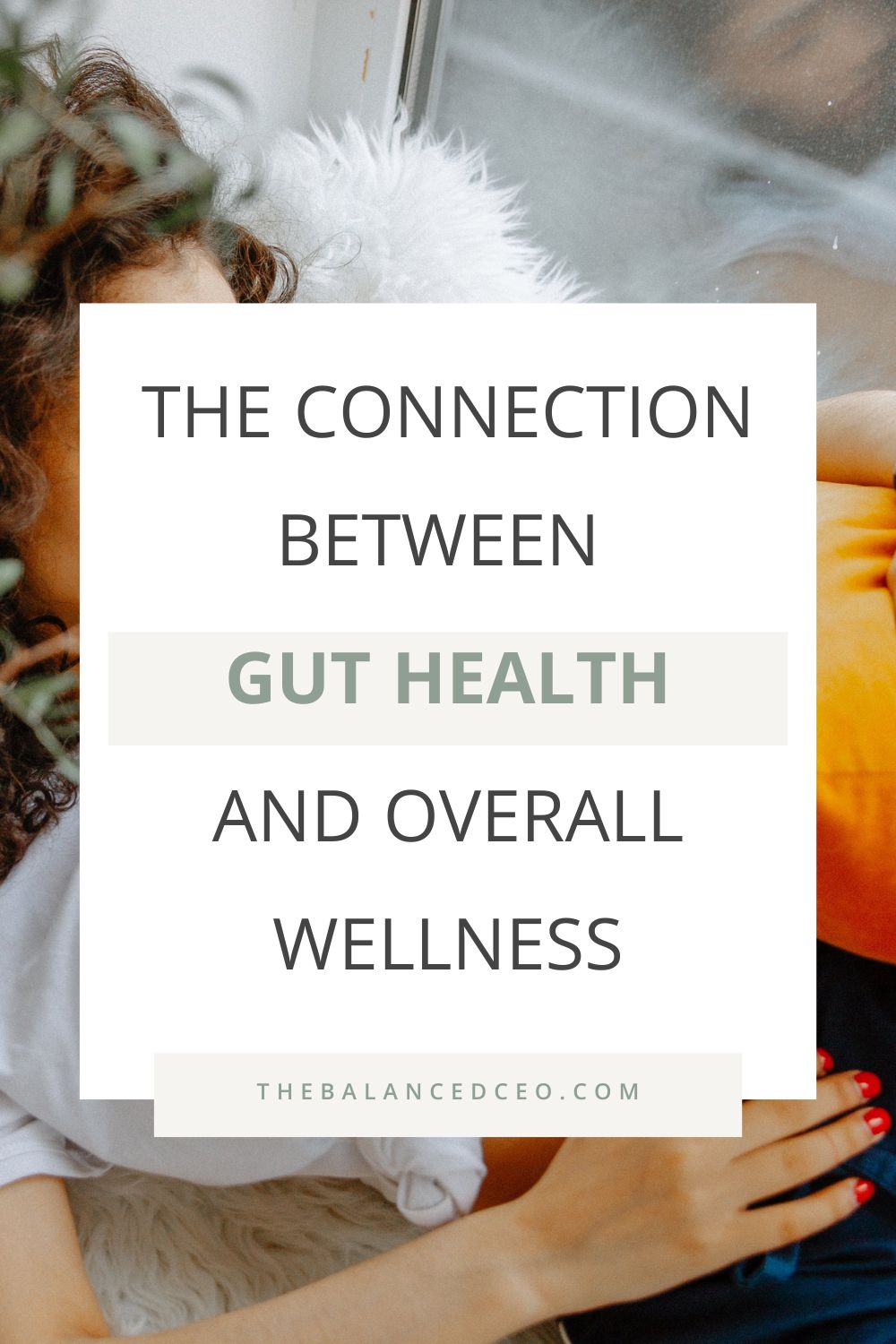This post may contain affiliate links, which means I’ll receive a commission if you purchase through my links, at no extra cost to you. Please read full disclosure for more information.

While I was studying to become a Certified Wellness Coach, I was introduced to gut health.
Most notably the gut-brain axis which is the connection between our digestive system and the brain. And I’ve been hooked on the topic ever since.
I think it’s pretty cool how what happens in your gut can positively or negatively affect your brain and vice versa.
This two-way connection just goes to show how complex the human body is and how important it is to approach wellness holistically.
Being and feeling “well” isn’t all about optimising physical health and nutrition.
There are so many layers to wellness which also includes keeping our mental health and overall well-being in check.
So when starting your wellness journey, you must approach it from a holistic level and consider all areas of your life and body, not just one or two aspects.
Here’s everything you need to know about gut health and the connection it has on your overall wellness.
Understanding gut health
To kick things off, let’s define gut health — because this means more than just digesting your lunch.
The gut is home to a complex ecosystem of trillions of bacteria, viruses, fungi and other microbes.
We call this “squad” the gut microbiome.
It is our gut microbiome that plays an important role in digestion, immunity and overall health.
Although studies on the gut microbiome are still relatively new — we know for sure that it is an incredibly powerful organ.
A happy gut can influence everything from your mood to your energy levels. This means that if your gut microbiome is not in good shape, it’s likely to impact both your physical and mental health.
If you check out this dentist in Oxnard CA, they’ll also tell you that your gut health is connected to your dental health as bacteria can travel between the mouth and stomach. If you have cavities, it can be a sign of unhealthy gut flora.
Gut health is therefore about maintaining a balance within this complex ecosystem so it continues to function for optimal health.
Because gut health has the power to influence multiple factors including mood, energy, immunity and autoimmune diseases (Better Health), it should be an essential area of focus within your wellness journey.
Because a healthy, happy gut equals a healthy, happy mind and body.
Factors that can affect gut health
Gut health is about keeping the digestive system and all the microbes living inside the digestive tract in harmony.
But just like we struggle to maintain a balance between our work and personal lives, the gut can also be thrown out of whack.
Various factors including stress, diet and medication can disrupt the balance of your gut health.
So let’s take a closer look and break down why each of these factors can be a gut disruptor:
Diet
What you eat truly does matter.
The gut microbiome thrives on a diet rich in fibre, nutrients and whole foods.
Because just like with the body, your gut microbiome needs the right fuel to function.
If it is fed a poor diet of overly-processed foods and sugary snacks, then chances are your gut will turn unhappy, affecting overall gut digestion and function.
I’ll dive into foods the gut microbiome loves shortly!
Medication
Certain medications, like antibiotics, can unintentionally harm the gut microbiome.
While antibiotics serve their intended purpose, by targeting and killing harmful bacteria, they may unintentionally eliminate some of the beneficial bacteria in your gut in the process.
Always be mindful of what you are taking for certain infections and ask your doctor about the impact your medication might be having on your gut microbiome.
Stress
The gut-brain connection is real which means that even stress can throw your gut off balance.
When you’re stressed, the body triggers the release of stress hormones like cortisol and adrenaline.
It is these stress hormones that disrupt the gut from functioning properly potentially causing indigestion, bloating, diarrhea, constipation, and even nausea. (Everyday Health)
How to support a happy, healthy gut
Just like how small, consistent changes lead to a significant difference on overall wellness, maintaining a happy gut doesn’t require a major overhaul.
In fact, supporting a happy, healthy gut starts at home. And this involves incorporating the below lifestyle habits into your existing daily routine.
If you successfully adopt these habits then you’ll experience a happier, healthier gut.
And a happy gut comes with a range of perks including:
- Improved digestion
- Zero bloating and tummy discomfort
- Stronger immune system
- Reduced risk of chronic diseases
- Better mental health
1 | Eat a well-balanced diet
Your gut loves it when you fuel it with the good stuff.
Pack your meals with a rainbow of fruits and veggies, and real whole foods. These fibre-rich foods are like a feast for your gut, promoting a thriving environment for beneficial bacteria to flourish.
Plus, all these foods come with essential nutrients that also support overall well-being. Because like I said earlier, what you eat really does impact how you feel.
Gut-boosting foods include:
- Colourful fruits and veggies
- Chickpeas, lentils and beans, etc
- Nuts and seeds
- Lots of protein – eggs, lean poultry and high-quality red meat
- Anything fermented – yoghurt, kimchi, sauerkraut, etc.
2 | Manage stress
Managing stress is like giving your gut a spa day.
By incorporating relaxing activities into your routine you can decompress and find calm in a busy world.
Think about starting your day with a gentle yoga flow, pausing into between tasks or work meetings and ending the day with a peaceful meditation.
I encourage you to take a moment now to brainstorm a list of 15 activities that you love and allow you to relax. And the next time you feel stressed or overwhelmed, choose one of these activities to unwind.
3 | Get enough sleep
Think of sleep as a reset button for your gut.
When you sleep, your body has the time and space it needs to repair and replenish itself. And one of the most important organs that heals during sleep, is the gut microbiome.
So make sure you are getting enough quality sleep a night.
Not only does sleep support gut health but it also sets the stage for improved mood, increased energy and overall well-being.
It is recommended that adults need between 7-9 hours of sleep so take the steps you need to prepare your mind and body for rest.
A few of my go-to tips include:
- Build a relaxing bedtime routine
- Go screen-free at least 1 hour before bed
- Swap out coffee for chamomile tea
- Listen to calming music
- Go to sleep at the same time every night
4 | Limit antibiotic use
To protect gut health, you must use antibiotics sensibly and as advised by your healthcare provider. Don’t overdo antibiotic use as this can disrupt the delicate balance of the gut microbiome.
It’s also worth considering adopting a holistic and healthy lifestyle as a proactive measure to avoid poor health and prevent the need for excessive antibiotic intervention.
5 | Stimulate the vagus nerve
Fun fact: The gut is often referred to as the second brain.
It literally has its own nervous system that is completely separate from the central nervous system, known as the enteric nervous system (ENS).
Every organ, including the ENS, is wired into the brain via the vagus nerve.
To keep your vagus nerve healthy, happy and functioning properly, it’s important to show it some love. And lucky for you, it’s pretty straightforward.
Ways to stimulate your vagus nerve include:
- Cold water therapy
- Deep breathing
- Acupuncture
- Yoga
- Massage
- Socialising
- Laughter
Final thoughts
In a nutshell, gut health is a cornerstone of overall wellness.
The gut directly influences mood, energy, illness and overall quality of life.
Lifestyle factors that contribute to overall wellness such as diet, sleep and stress are also factors that can disrupt the balance of the gut microbiome.
It’s therefore essential that you prioritise the above lifestyle habits to nurture a thriving gut which ultimately contributes to optimal health and well-being.
It’s also worth noting that gut health is complex and unique to the individual.
Don’t fall for quick fixes.
There’s no magic food or product that will magically fix an imbalanced gut microbiome.
It’s about implementing and maintaining the above habits so they become a regular part of your lifestyle.
By taking care of your gut, you can ensure you’re taking care of yourself on a holistic level.

Thalia-Maria Tourikis
Guest blogger
I’m not like the other wellness girls you see online.
I don’t drink coffee or matcha lattes and I’m not a huge fan of green smoothies. Give me a medium-rare steak with a glass of red wine any day and I’ll be a very happy girl.
I’m also famous for my slow mornings. You won’t see me waking up at 5 am and following an unsustainable “That Girl” routine but instead ignoring my alarm and choosing to read a fiction book over going to the gym.
Holistic wellness is my jam, and I believe it can be attainable for everyone – you just need to approach it in a way that works for you. So if you’re craving a more realistic approach to wellness, you can find me on Instagram and Pinterest all under @notesbythalia
And for deeper “how to” posts that empower you to do things on your own terms, head over to my blog notesbythalia.com





Great insights here.